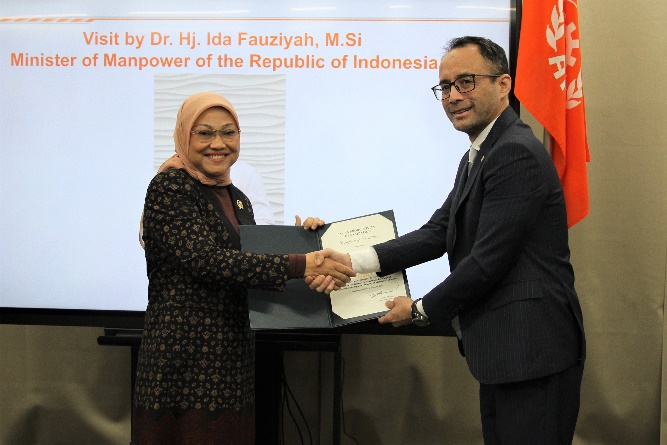Indonesian Minister of Manpower and APO Secretary-General Discuss Expanded Collaboration for Productivity Enhancement
Indra Singawinata. Minister Ida referred to successful projects in Indonesia, particularly focusing on Green Productivity (GP), supported by the APO and hoped to strengthen collaboration for improving national productivity. 
"On behalf of the Indonesian government, we appreciate the continued support of the APO, particularly in the demonstration projects on PVC solar panels in the TVET center in Sorong, West Papua, completed 2021, and GP Specialist Certification Body development program with the formation of the Professional Certification Agency for Productivity in the Indonesian National Productivity Organization," the Minister stated. She added that, "Indonesia's national plan 2020–24 includes formulation of productivity measurement at provincial and sectoral levels; implementation of productivity gainsharing; reformulation of minimum wage calculation by incorporating productivity-based performance; and expansion of productivity networks through developing a database and application system."
"The APO is pleased that projects were successfully implemented in Indonesia during 2021–22 and has prepared proposals for projects in 2023," responded Secretary-General Dr. Indra. He appreciated Indonesia's continued support and cooperation and shared ideas on future programs, covering millennial leaders to drive rural development, tourism 4.0, and women's leadership in public-sector organizations.
Hashtag: #APO
The issuer is solely responsible for the content of this announcement.
About the APO
The APO is an intergovernmental organization established in 1961 to increase productivity in the Asia-Pacific region through mutual cooperation. The APO contributes to the sustainable socioeconomic development of the region through policy advisory services, acting as a think tank, and undertaking smart initiatives in the industry, agriculture, service, and public sectors.
The APO is shaping the future of the region by assisting member economies in formulating national strategies for enhanced productivity and through a range of institutional capacity-building efforts, including research and centers of excellence in members. It is nonpolitical, nonprofit, and nondiscriminatory.
The current membership is 21 economies, comprising Bangladesh, Cambodia, the Republic of China, Fiji, Hong Kong, India, Indonesia, the Islamic Republic of Iran, Japan, the Republic of Korea, Lao PDR, Malaysia, Mongolia, Nepal, Pakistan, the Philippines, Singapore, Sri Lanka, Thailand, Turkiye, and Vietnam.


